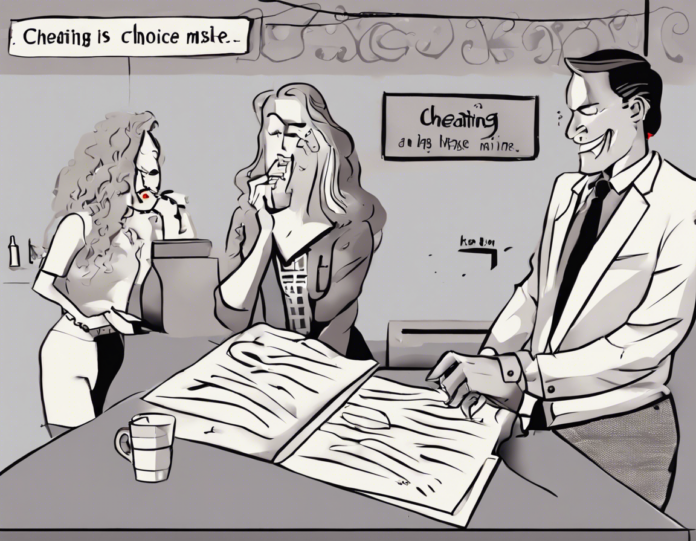In the realm of relationships, the issue of infidelity is a deeply complex and emotionally charged topic. Cheating is a breach of trust that can have devastating consequences on both partners involved. While some may view infidelity as a mere accident or a moment of weakness, research and experts in the field suggest otherwise. Cheating is often a conscious decision made by individuals, influenced by a variety of factors. In this article, we will delve into the psychology behind infidelity and explore why people cheat, the impact it has on relationships, the signs to look out for, and how to move forward after an incident of cheating.
The Psychology of Cheating
It is essential to recognize that cheating is not simply a matter of impulse or opportunity. According to psychologists, infidelity is often rooted in deeper emotional issues within the individual. Insecurity, low self-esteem, lack of communication in the relationship, unresolved conflict, or even a desire for validation and excitement are just a few factors that can contribute to someone straying outside of their committed relationship.
Research has also shown that individuals who have a history of attachment issues or who have witnessed infidelity in their family of origin may be more prone to cheating. These individuals may struggle with intimacy and seek validation from multiple partners, viewing it as a way to fulfill their unmet emotional needs.
The Impact of Cheating on Relationships
Infidelity can have profound effects on relationships, often leading to feelings of betrayal, hurt, and a breakdown of trust. The partner who has been cheated on may experience a range of emotions, including anger, sadness, shock, and confusion.
The discovery of infidelity can shatter the foundation of a relationship, leaving both partners questioning the authenticity of their bond. It can lead to feelings of inadequacy, self-doubt, and a loss of confidence in oneself and the relationship.
In some cases, infidelity can be a catalyst for positive change in a relationship. Couples who are willing to confront the issue head-on, communicate openly, and seek professional help may be able to rebuild their trust and create a stronger, more resilient bond.
Signs of Cheating
It’s essential to be mindful of potential warning signs of infidelity in a relationship. While these signs do not necessarily indicate that cheating is occurring, they may warrant a deeper conversation with your partner:
- Increased secrecy: If your partner is suddenly more guarded with their devices, passwords, or whereabouts, it could be a red flag.
- Emotional distance: A noticeable shift in your partner’s emotional connection or intimacy could indicate that they are seeking fulfillment elsewhere.
- Changes in routines: Unexplained absences, frequent overtime at work, or sudden changes in habits could be signs of cheating.
- Defensive behavior: If your partner becomes defensive or evasive when questioned about their activities, it may be a cause for concern.
- Intuition: Trust your gut instincts. If you sense that something is off in your relationship, it’s important to address your concerns.
Moving Forward After Cheating
Recovering from infidelity is a challenging journey that requires patience, open communication, and emotional support from both partners. Healing takes time, and it’s essential to allow yourself and your partner the space to process emotions and work towards rebuilding trust.
Couples therapy can be incredibly beneficial in navigating the aftermath of infidelity. A trained therapist can help facilitate honest conversations, identify underlying issues, and provide tools for reconciliation and rebuilding intimacy.
Individual therapy may also be beneficial for both partners to address any personal issues that may have contributed to the infidelity. Self-reflection, self-forgiveness, and a commitment to personal growth are essential components of moving forward after cheating.
Frequently Asked Questions (FAQs)
1. Is cheating always a conscious decision?
Cheating is often a conscious decision, influenced by a variety of emotional and psychological factors. While some instances of infidelity may occur in the heat of the moment, many cases involve a deliberate choice to seek validation or fulfillment outside of the relationship.
2. Can a relationship recover from infidelity?
Yes, relationships can recover from infidelity with effort, commitment, and professional help. Couples who are willing to address the underlying issues, communicate openly, and rebuild trust can emerge stronger from the experience.
3. How can I rebuild trust after cheating?
Rebuilding trust after cheating takes time and consistency. It’s important for the partner who cheated to be accountable for their actions, demonstrate remorse, and communicate openly. The partner who was cheated on may need support and reassurance as they navigate their emotions.
4. What are some healthy ways to address relationship issues without resorting to cheating?
Healthy communication, empathy, and active listening are essential components of addressing relationship issues. Couples can benefit from setting boundaries, practicing self-care, and seeking counseling if needed to navigate challenges in the relationship.
5. How can I know if my partner is cheating?
While there is no foolproof way to determine if your partner is cheating, it’s important to pay attention to changes in behavior, communication patterns, and intuition. If you have concerns, it may be helpful to have an honest conversation with your partner or seek guidance from a professional.
In conclusion, cheating is a complex issue that requires empathy, understanding, and a willingness to address underlying emotional factors. By acknowledging the psychology behind infidelity, recognizing the impact it can have on relationships, and taking proactive steps to address and heal from cheating, couples can navigate this challenging experience and emerge stronger on the other side.




